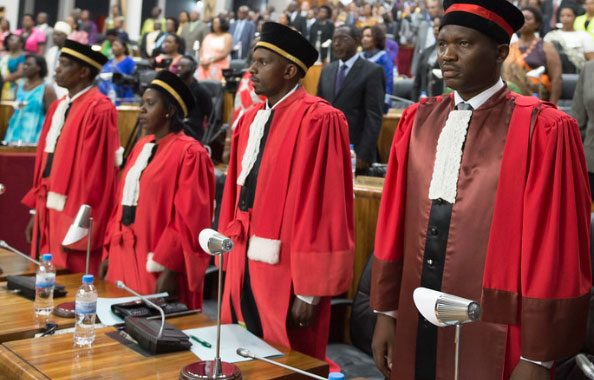
Kigali, Rwanda | KELLY RWAMAPERA | Rwanda President Paul Kagame has taken issue with a Supreme decision to retain as a criminal offense, insults or defamation against the Head of State, who is also a public official.
He urged further debate on the matter, saying that his position has always been “that this [defamation offenses] should be a civil not a criminal matter, ” according to a statement released Thursday 25 April 2019 from the Office of the President.
The statement said that while “The President of the Republic respects the independence of the judiciary and the recent Supreme Court decision” he takes issue with the verdict.
“The President trusts that there will be further debate on this important matter” the statement read.
A Kigali Lawyer Richard Mugisha had filed a constitutional petition against five provisions in the penal code including one that criminalizes cartooning on the head of state, questioning the constitutionality of the five provisions.
The Supreme Court on Wednesday 24 April 2019, ruled that it was a criminal offence to caricature an official in public service or religious cults but maintained that the head of state was not in the same category as other public officials.
The statement from the Vilage Urugwiro however expressed different feelings about the decision, saying that the head of state is the same as other public servants.
“The President takes issue with the decision to retain as criminal offenses, insult or defamation against the Head of State, who is also a public official” the statement explained.
In recent ruling, the supreme court removed:
Article 154: “Any person who publicly defames religious rituals, symbols and religious cult objects by use of actions, words, signs, writings, gestures or threats, whether carried out at the place where rituals are intended to be performed or where they are normally performed, commits an offense.”
Article 233: “Any person who, verbally, by gestures or threats, in writings or cartoons, humiliates a member of Parliament when exercising his/her mandate, a member of the Cabinet, security officers or any other person in charge of a public service in the performance or in connection with the performance of his/her duties, commits an offense.”
However, the jury maintained the similar article 236 that criminalizes insult or defamation against the president of the Republic with punishments of up to a seven-year jail term and fines up to Rwf7 million.
The president’s view about the statement is expected to raise more debates on the article in the next days especially that the media has always wanted all three articles that criminalize defamation to be repealed from the penal code.
After the decision on Wednesday 24 April 2019, Mugisha also sparked debate over the court ruling to maintain decriminalization of defamation against the Head of State, arguing that the provision is unrealistic in and evolving media era.
“The law doesn’t offer protection to the president because the media has evolved. There’re a lot of social media platforms which are impossible to be made answerable to the law,” he said.
 The Independent Uganda: You get the Truth we Pay the Price
The Independent Uganda: You get the Truth we Pay the Price



